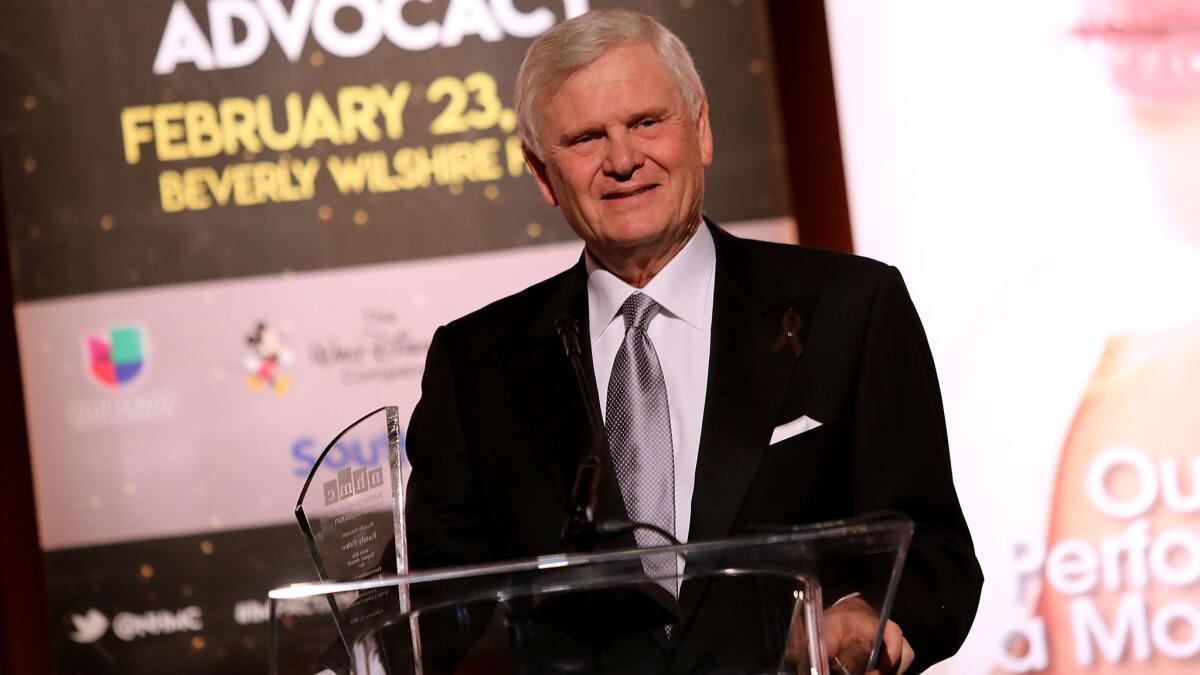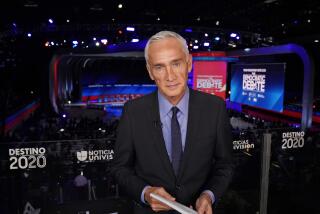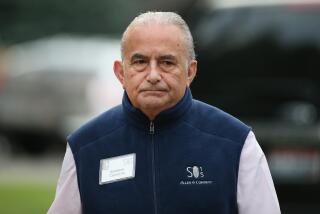Univision Chief Executive Randy Falco to retire as media company struggles

- Share via
Univision Communications Chief Executive Randy Falco is stepping down after nearly eight years — a move that underscores disarray within the nation’s largest Spanish-language media company.
Univision board Chairman Haim Saban made the announcement Wednesday night.
“Recently Randy came to us and told us that he would like to retire at the end of 2018 when he will turn 65 years old,” Saban said in a statement, noting that the board had “reluctantly agreed to Randy’s wishes.”
The surprise resignation comes just four months after Univision renewed Falco’s contract, which would have extended his tenure through January 2020.
But tensions have heightened inside Univision. The company must come up with a long-term strategy — and new leadership — at a time when it can no longer count on millions of Spanish-speaking immigrants to stay glued to their TVs.
Univision’s board this year brought in a management firm to review the company’s operations and make recommendations on a companywide restructuring, according to two people familiar with the process but not authorized to speak publicly.
One person said the consultants have been searching for as much as $200 million in cost-savings, an enormous sum that could result in substantial layoffs.
Falco’s resignation came one day after the company said Chief Financial Officer Francisco J. Lopez-Balboa was departing “to pursue other opportunities.” Univision executive Peter H. Lori was named the new CFO, effective this week.
Univision is owned by a consortium of private equity owners who bought the Spanish-language media company in 2007 for more than $13 billion — a leveraged buyout that left the company swimming in debt. In 2015, the company unveiled plans for a public offering that would have allowed Saban Capital and the other private equity firms to finally begin an exit.
But on Tuesday, Univision said it had abandoned its IPO plans. Lopez-Balboa was hired in 2015, in part, to help guide the IPO process, and his role was diminishing, one of the knowledgeable people said.
Complicating the picture for Univision’s owners has been a change in demographics and President Trump’s stand on immigration. The president has been hostile to immigrants, including those from Mexico who have long made up a large part of Univision’s audience. The Trump administration’s crack-down on immigrants — and the promise of a border wall — has discouraged new arrivals.
Immigration has long fueled the audience for Univision’s television networks and radio stations. But growth in the Latino population increasingly has come from people born in the U.S. who are fluent in English and watch major television networks — not just the Spanish-language outlets.
New York-based Univision and its equity partner, Grupo Televisa of Mexico, also have seen their once popular telenovelas lose steam in the ratings. The two companies have been scrambling to better adjust to a more competitive environment and create content that is more relevant to the lives of U.S.-born Latinos.
Meanwhile, archrival Telemundo has gained traction in the market. Telemundo finished 2017 as the top-rated Spanish- language broadcast network in prime-time on weekday nights among the prized demographic of adults aged 18-49.
Telemundo will broadcast this year’s World Cup, which has long been a signature event for Univision. Telemundo, which is owned by NBCUniversal, outbid Univision in 2011, the last time the World Cup rights were up for grabs. The big-ticket soccer event should give Telemundo an audience bounce this summer.
In addition, cord-cutting has accelerated in the last three years, affecting all television programmers. Now Univision must compete against Telemundo and streaming services including Netflix and Hulu.
Univision’s revenue in the fourth quarter fell nearly 8% to $780.7 million compared to $846.5 million during the same period a year ago.
Univision has significant operations in Los Angeles, including its flagship television station KMEX-TV Channel 34. But two years ago, the company sold its prominent building that overlooks the 405 freeway in Los Angeles for $102 million to real estate firm CBRE Global Investors.
During his tenure, Falco, a former top NBC and AOL executive, has added cable channels such as Univision Deportes Network, overhauled operations and launched streaming services to diversify Univision’s revenue.
“During his time as CEO he has modernized the Univision organization, grown earnings and reduced debt at record levels and we could not be more pleased with his performance,” Saban said, noting that Falco will assist as the company begins its restructuring.
UPDATES:
8:50 p.m.: This article was updated with additional details on Univision’s challenges.
This article was originally published at 5:55 p.m.
More to Read
Inside the business of entertainment
The Wide Shot brings you news, analysis and insights on everything from streaming wars to production — and what it all means for the future.
You may occasionally receive promotional content from the Los Angeles Times.











